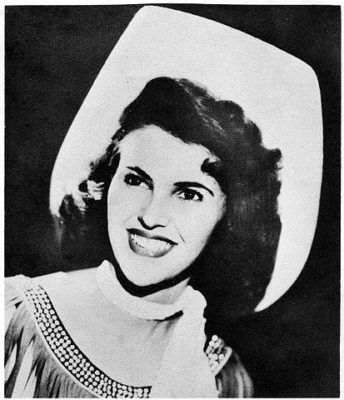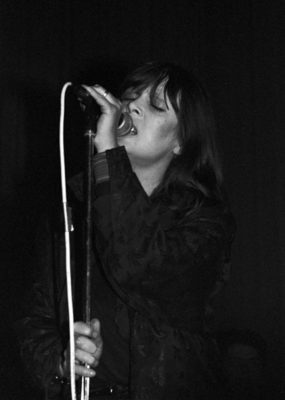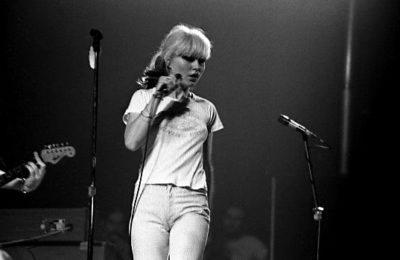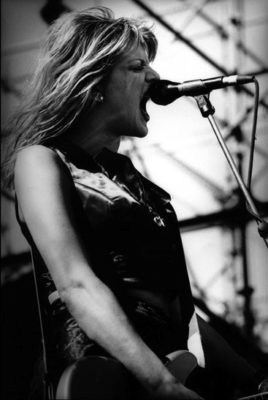Breaking news: women have always been a part of rock music, and not just as trailblazers for their own gender. In honor of National Women’s History Month, here’s a look at five acts whose emergence marked a sea change in music, inspiring men and women alike to take note of the shifting atmosphere that these visionaries helped spearhead.
Wanda Jackson

Seeking to make her mark in a still-developing genre known as rockabilly, Wanda Jackson found herself at odds with 1950s notions of marketability; she initially struggled to secure a record deal for fear that the public wouldn’t buy into a woman making the type of music typically associated with Elvis Presley and Carl Perkins. But eventually, Jackson’s remarkable voice was heard, and she shocked audiences by attacking her songs with fierce, rollicking abandon, showcasing a vocal timbre that was sharp, raunchy and gritty in ways distinct from any rock singer before her. Though her roots were pure country, Jackson utilized a reckless snarl—best heard on her definitive rendition of Lieber-Stoller’s “Riot in Cell Block Number 9”—that predated punk rock by almost two decades.
Nico

Remembered mostly for her association with Andy Warhol and her short-lived partnership with The Velvet Underground, the German chanteuse known as Nico didn’t just change the art of singing for women in rock music—she changed singing, period. Possessing a love-hate relationship with the concept of pitch as well as an icy detachment that often approached boredom, Nico shattered all notions that singing had to be beautiful or even emotional. Her work on the 1967 masterpiece The Velvet Underground and Nico, including the droning “All Tomorrow’s Parties,” the charming “I’ll Be Your Mirror” and the coy “Femme Fatale,” set the stage for alternative and indie rock, and “These Days,” written and later recorded by Jackson Browne, is arguably her crowning achievement.
Debbie Harry

Far from the first woman to emerge out of the burgeoning punk rock movement of the mid-1970s, Harry and her fellow Blondie band members were nonetheless pioneers of the spinoff new wave movement, thanks in no small part to the bandleader’s flexible voice and chameleon-esque persona. Nowhere is Harry’s range more evident than on the 1978 landmark release Parallel Lines. Her delivery moves seamlessly from urgent (“Hanging on the Telephone”) to spacey (“Fade Away and Radiate”) to desperate (“One Way or Another”), and each song on the album, no matter how musically diverse, is unified by Harry’s charisma and presence.
Hole

If anyone hears about Courtney Love today, it’s often in the gloomy context of her deceased husband Kurt Cobain, which really isn’t fair—the popular myth that she was a leach who did nothing more than contribute to the Nirvana front man’s demise demonstrates martyrdom at its ugliest. The proof is found in the music of Love’s own band, Hole, who, during a time in which male-dominated groups like Silverchair, Live and Bush were peddling watered-down facsimiles of grunge angst, offered songs that hit harder, cut deeper and displayed more lyrical wit than almost any other mid-1990s act could muster. Whether collaborating on songwriting with lead guitarist Eric Erlandson or her friend Billy Corgan of Smashing Pumpkins, Love’s bold candor always made for an intriguing listen.
Sleater-Kinney

Listening to classic rock stations would lead the uninitiated to believe that rock ended with Nirvana and Pearl Jam. But for those paying attention, rock continued to thrive well into the 21st century, and this trio from Olympia, WA, is a big reason why. Corin Tucker’s wailing vocals pierce through anything, Carrie Brownstein’s deadpan singing and sublime guitar work provides the perfect counterpoint, and secret weapon Janet Weiss’s forceful rhythms make her one of the best drummers of the past 20 years. After a 10-year hiatus following a near-flawless run of albums, the band returned with 2015’s No Cities To Love and proved they hadn’t lost one bit of their edge.


















